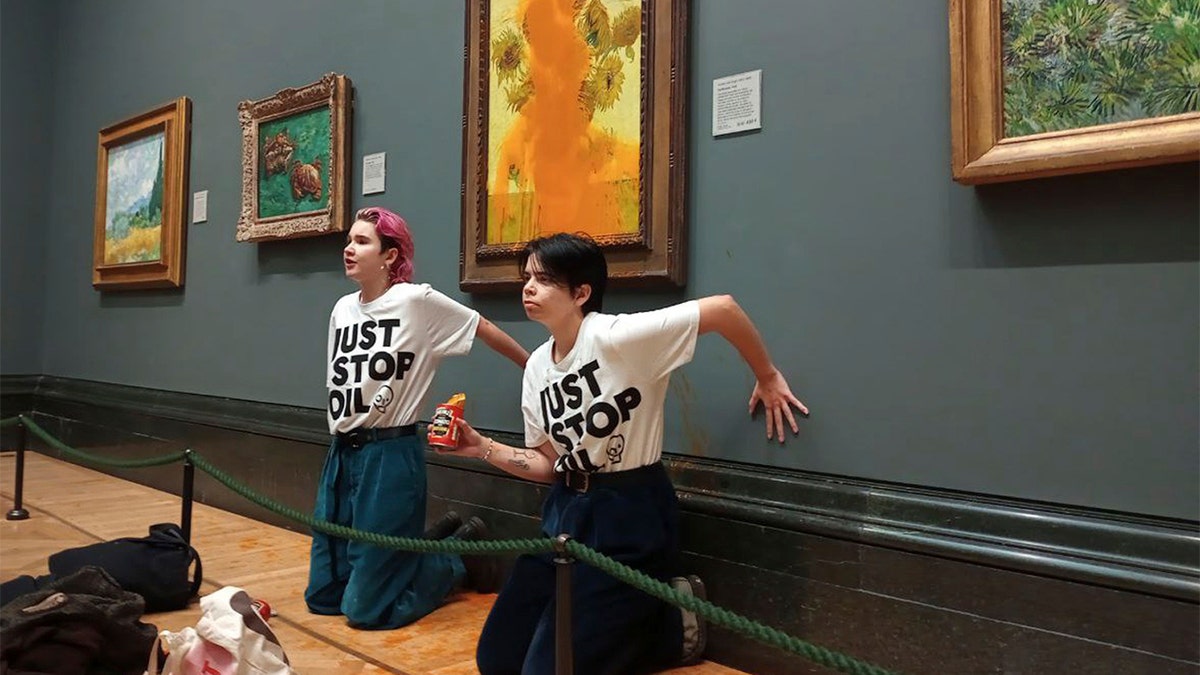Biden's climate politics undermining U.S. energy independence: Charles Payne
Fox Business anchor and host of 'Making Money' Charles Payne joins 'Hannity' to sound off.
The New York Times published a guest essay Thursday by radial environmentalist Andreas Malm defending climate change protesters who defiled a Vincent van Gogh painting with tomato soup at the National Gallery in London earlier this month.
Malm is the author of "How to Blow Up a Pipeline: Learning to Fight in a World on Fire," a book that advocates for ecoterrorism and criticizes pacifism among the more peaceful climate activists.
"As a rule, I tend to think sabotage is most effective when it is precise and gritty," Malm wrote in the New York Times essay.
He praised Just Stop Oil, the painting protesters' group, for how they "smashed gas stations in April this year," saying for that action, "they hit the nail on the head. Gasoline, unlike a van Gogh painting, is a fuel of global warming" which "must be shut down to save humanity and other life-forms."

The New York Times published a guest essay by radical environmentalist Andreas Malm, who calls for property destruction as a form of climate protest. (REUTERS/Shannon Stapleton/File Photo)
Malm said that while he was first skeptical of the effectiveness of the group switching from attacking gas stations to priceless works of art, he has since changed his mind.
"There might be room for this kind of action, too," he wrote.
"By doing something so scandalous, Just Stop Oil forced media and the wider public to pay attention to the fact that the British government is about to hand out 100 licenses for new oil and gas projects when there cannot be a single one more," he continued.
Europe is experiencing devastating energy shortages amid Russia's invasion of Ukraine and policy leaders' decision to transfer away from oil and gas and toward alternative sources of power. Inflation in the United Kingdom is at a forty-year high amid rising food and energy costs.

Handout photo issued by Just Stop Oil of two protesters who have thrown tinned soup at Vincent Van Gogh's famous 1888 work Sunflowers at the National Gallery in London, Friday Oct. 14, 2022. (Just Stop Oil via AP)
"The climate movement in the Global North seems to be reading its history. In the past year, activists have been taking up the tactic of sabotage and property destruction along a spectrum from symbolic to serious," Malm said, after favorably compared their actions to those of British suffragists.
He wrote that so-called "leading energy scholars" at Boston University "are discussing the pros and cons of climate militancy and coming down, remarkably, in favor of considering a full range of options, including civil disobedience and guerrilla warfare."
While noting it was important to "make sure that no one is physically harmed in the process," he justified extreme action, saying, "As for the ethics of property destruction, it is not, in this case, very complicated. Fossil fuels kill people. If you disrupt the flow of such fuels and damage the machinery they impel, you prevent deaths. You stop the perpetration of harm."

Handout photo issued by Just Stop Oil of two protesters who have thrown tinned soup at Vincent Van Gogh's famous 1888 work Sunflowers at the National Gallery in London, Friday Oct. 14, 2022. The group Just Stop Oil, which wants the British government to halt new oil and gas projects, said activists dumped two cans of Heinz tomato soup over the oil painting on Friday. London’s Metropolitan Police said officers arrested two people on suspicion of criminal damage and aggravated trespass. (Just Stop Oil via AP)
CLICK HERE TO GET THE FOX NEWS APP
Malm concluded, "We don’t know what, if anything, will work, which is why, perhaps, the movement needs both: flippant attention grabbing as well as surgical shutdowns, in a diversity of disruptions. We cannot afford to forgo creative methods that might further the cause."











































